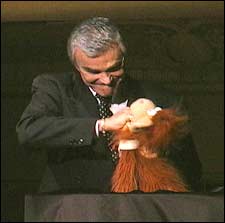VHS Vednesday: Caravaggio
Okay, I know that so far, my "VHS Vednesday" reviews have focused mostly on low-budget thrillers of varying degrees of quality...but you know, just because a movie hasn't gotten a DVD release yet doesn't mean it's schlocky. So, this week, I'm going highbrow.
CARAVAGGIO (1986). Directed by Derek Jarman. Starring Nigel Terry, Sean Bean, Tilda Swinton, Robbie Coltrane, and Michael Gough.

The late British director Derek Jarman was known for his striking visual style--he was a painter and poet as well as a filmmaker. With his background in the arts, it's unsurprising that perhaps his most widely-known film would be about a great artist. Caravaggio stars Nigel Terry (an acclaimed British stage actor, most familiar to US audiences as King Arthur from John Boorman's Excalibur) as the famed Italian Baroque artist Michelangelo Caravaggio, in a predominantly fictionalized, symbolic account of the painter's life, from his childhood to his rise to fame to his exile and death. A young Sean Bean co-stars as Ranuccio Tomassoni; while there is little historic evidence for Caravaggio knowing Tomassoni before the 1606 brawl in which Caravaggio killed the younger man, Jarman presents a complex love-hate relationship between Caravaggio (the passionate artist) and Ranuccio (the streetwise, manipulative hustler). Recent Oscar-winner Tilda Swinton makes her film debut as the fictitious Lena, a gypsy prostitute who becomes Caravaggio's muse and Ranuccio's lover. In smaller roles, the familiar screen veteran Michael Gough brings his trademark gravitas to his portrayal of Caravaggio's patron Cardinal, and Robbie Coltrane is wonderfully slimy as the Pope's lecherous nephew.
While many of Jarman's films completely disregard conventional narrative (including such completely abstract works as The Last of England and The Garden), Caravaggio is one of his most straightforward pictures. However, several of Jarman's trademarks are still on display...deliberate anachronism, striking tableaux (sometimes both at once, as in a scene where one of Caravaggio's critics pounds out a scathing review on a typewriter, before settling back in his bath in a re-creation of Jacques-Louis David's The Death of Marat), and eloquent (occasionally sexually explicit) monologues. It's not for all tastes, perhaps, but I found it an engrossing viewing experience.
Who's Leaving This Off Their Resume?
No one. None of the people involved in this production have any reason not to be proud of it.
Labels: vhs vednesday


0 Comments:
Post a Comment
<< Home